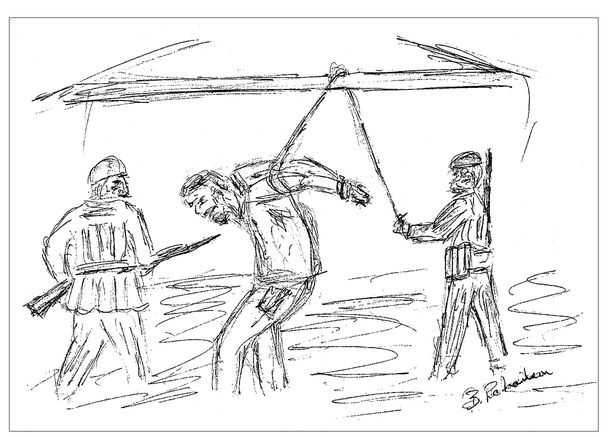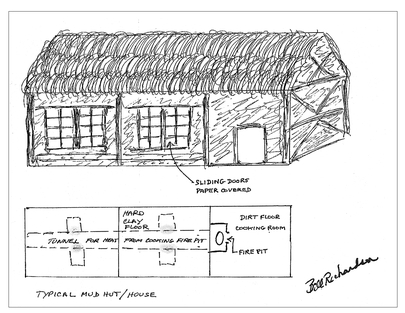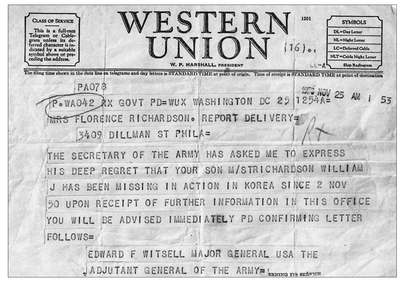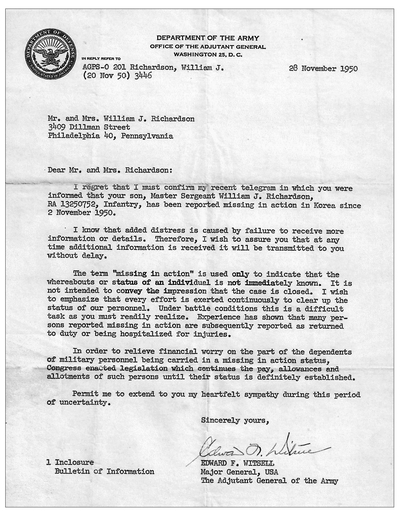Valleys of Death (22 page)
Authors: Bill Richardson

Two nights later he died in his sleep. We took the body behind the house and dug a shallow grave. There were four of us in the burial party, and a man from South Carolina said a few words. We closed the grave and filed back inside. Everyone was silent. Graves was the first to die. Seven from our two rooms would soon follow him.
The valley had turned into one of death and suffering.
Soon after Graves's death, Chaplain Kapaun came to the house. We were all surprised to see him. I had last seen him at Unsan, but when he walked in I barely recognized him. The man I'd met on a ridge in Pusan was gone. He'd lost a lot of weight and his uniform kind of hung on his frame. His tired and worn-out eyes belied his warm smile.
“Where are you staying?”
“I'm staying with the officers in the house at the top of the valley,” Kapaun said. “Dr. Anderson is also there and he is trying to get the Koreans to allow him to see the wounded.”
The North Koreans were allowing the chaplain to move up and down the valley to visit us. There were about eight hundred prisoners in the valley. Kapaun spent about ten minutes in our house. Some of the guys asked about friends. Kapaun also told us who was dead or wounded. Before he left, he told us to get organized.
“We'll need to take action when the troops show up,” he said. “Have a plan. When the troops get close, the North Koreans might try and kill us.”
Kapaun believed our troops were close and it was only a matter of time before we'd be liberated. Before leaving, he promised to pray for each one of us. As he left the room and walked away, I stood near the house and watched him go. I didn't know if he was right about the troops coming or if they were close, but I felt good and couldn't wait until he returned.
Kapaun never came back to my house, but he continued to visit troops in the valley. I know he prayed for each one of us and when he could, brought food to the starving, until he became so weak that the guards took him to the hospital. He died of pneumonia in May 1951 and was buried in a mass grave by the Yalu River.
I took Kapaun's warning seriously, and the next day we started to watch the guards religiously, trying to understand their routine. The six guards that patrolled our house were all young and seemed nervous. Two guards each shift manned posts outside the buildings. They would holler at us when we moved too far from the house, but never came close enough to touch us. The goal, when the troops came, was to lure the guards to us and then overpower them. I tapped six of the strongest guys to be ready and to wait for my signal. I wanted to make sure our troops were close before we sprung the plan.
While out getting water one morning, I saw one of the guards bouncing up and down on the ground trying to keep warm. Each time he hit the ground, it gave like it was hollow underneath. I figured it was a root cellar and hoped there was food inside. Since we knew the guards' patterns, I waited until they were out of sight and dashed to the cellar and threw off the wooden board covering the door.
Inside there were vats of kimchi, a pickled dish of vegetables, mostly cabbage and varied seasonings. It stunk to high heaven, but it was better than the millet. Looking over my shoulder to make sure I was clear, I started to fill two helmet liners full of kimchi. I raced back and another soldier went with two more helmet liners. He was halfway back to the house when the guards appeared. They shouted and he dropped one helmet liner and ran like hell into the house. We waited for the guards to come. We could hear them talking and poking around the cellar, but they never came into the house.
“Maybe we got away with it,” I said.
But I didn't feel that lucky. The next morning, the guards were at the cellar removing what was left of the kimchi. We usually got a bucket of millet, but this time we only got an English-speaking officer. He was small with a pocked face and dark, piercing eyes and an angry scowl pasted across his lips. I'd never seen the little son of a bitch before. He looked into the room and didn't say a word. We could feel his eyes on us. Finally, he started to call us one at a time back to the kitchen. I was one of the first to be taken out.
“Who took food? You tell me. You will not get food until you tell. You take food, no?”
I shrugged my shoulders.
“Nope,” I said.
“You go back to room, I will get you again,” he said. “You will tell who took the food.”
When I got back, everyone was quiet. No one looked up at me.
“They're trying to figure out who took the kimchi,” I said.
They all started talking at the same time in a machine gun burst of nervous chatter.
“Did they do anything to you?”
“Did they threaten you?”
I shook my head no. I tried to stay cool. Fearless. I knew the men were nervous, some scared. But I didn't want them or the North Koreans to see anything but cool.
“They are going to send for me again,” I said. “That is what the little son of a bitch said.”
Everyone got very quiet again.
“Don't worry. If I don't know anything, I can't tell them anything,” I said with an almost cocky grin.
I kind of liked the little cat-and-mouse game the North Korean officer wanted to play. It kept my mind active and not thinking about food or home.
“But you know,” one of the younger soldiers said.
“Shut up, asshole,” Sergeant Martin snapped. He understood what I was doing.
Everyone sat quietly again. I wondered what I was in for and started to let my mind drift away, repeating over and over to myself that I didn't know anything.
“If I know nothing, I can't tell them anything,” I repeated in a steady mantra. “If I know nothing, I can't tell them anything.”
It wasn't long before the son of a bitch was back. He threw the door open and pointed at me.
“You come,” he said.
I looked around and finally pointed at myself.
“Me?” I asked. I knew damn well he wanted me, but I wasn't going to come easily. I wanted the men to see me put up a little bit of resistance.
“You. You. You come.” Now there was no doubt he wanted me. He took me back to the kitchen area and started the questioning all over again.
“Who took the kimchi?”
I shook my head again.
“Your guards took it. We saw them last night and early this morning. Go check.”

Punishment for stealing kim chi.
Sketch by author
Sketch by author
I could see the rage building up. He snatched his pistol and started waving it around like a madman. Oh shit, I thought. I was about to get shot over a few handfuls of pickled cabbage.
“You lie. You know and you tell me.”
Eyeing that pistol, I figured I could take him and shove it straight up his ass. But there were two more North Korean soldiers standing behind me.
“Nobody eat until you tell me,” he said.
They had not fed us that morning and it was getting late in the afternoon. I knew the men needed to eat. We were weak and missing a day, even if it was that putrid millet, was out of the question. Plus, there was no telling how long they'd starve us.

Typical Korean hut/house.
Sketch by author
Sketch by author
“I did it,” I finally said. “Only me.”
Now it was the officer's turn to shake his head no.
“You lie. More do it.”
“No. Only me and the guards,” I said.
The little son of a bitch looked at me and then nodded to the guards, who grabbed me and tied my arms behind my back.
“You learn lesson now,” the officer said.
The guards threw a rope over an open truss and pulled me up by my arms until my feet barely touched the dirt floor. The pain was excruciating. I could feel lightning jolts of pain in my left arm and shoulder where I still had shrapnel wounds. The pain quickly crept up my arms, driving straight to the top of my head. I gasped for air. The pressure on my chest only allowed me to take sharp short breaths. I could hear myself moaning, and once I cried out in pain before I passed out.

Telegram notice of missing in action status.
Author's collection
Author's collection

Letter confirming status as missing in action.
Author's collection
Author's collection
I woke up on the dirt floor. I could barely feel the guards pulling the ropes off my arms. I could hear the son of a bitch rattle off a few orders. He sounded far away, but I could see his boots and knew he was standing over me. The guards dragged me to my feet. Throwing open the door, they tossed me onto the floor of my room. I could barely move my arms and legs and stayed where I landed the rest of the night. Martin helped me get comfortable and told me that the house had been fed earlier that night. He had no idea how long I'd been strung up.
The next morning, I sat up and started making jokes. Some of them laughed with me. Others were just scared. Laughing hurt my ribs, but it was the first time I'd done it since Unsan. I was determined to keep my sense of humor. It was tied to my will to live. From that point on I remembered to laugh when I could.
“Well, I guess we won't be having kimchi anymore.”
CHAPTER SEVENTEEN
REMINISCENT OF ANDERSONVILLE
After two months in the valley, the guards marched us out of the valley and back up the road to Pyoktong.
It was January. As we walked, snow started to fall. It felt good on my face and buried the valley in a white blanket. But the snow couldn't cover the memory of the more than three hundred men we'd lost. All of them died from neglect.
Instead of stopping outside the town, the guards marched us into the center of Pyoktong. The North Koreans and Chinese had moved hundreds of North Koreans out of their homes in Death Valley to make the first camp. They had done the same thing in Pyoktong, moving all but a few families out of the town and filling their homes with prisoners.
Other books
Black Night by Christina Henry
Educating Jane Porter by Dominique Adair
An Escape to Love by Martel, Tali
A Designed Affair by Cheryl Barton
Saving Amy by Daphne Barak
Imperative: Volume 1, A Tale of Pride and Prejudice by Wells, Linda
Solitary: A Novel by Travis Thrasher
Taking Chances: A Donnelley Brother's Novel by Carbonneau, Alannah
The Apocalypse Club by McLay, Craig
Perv by Becca Jameson